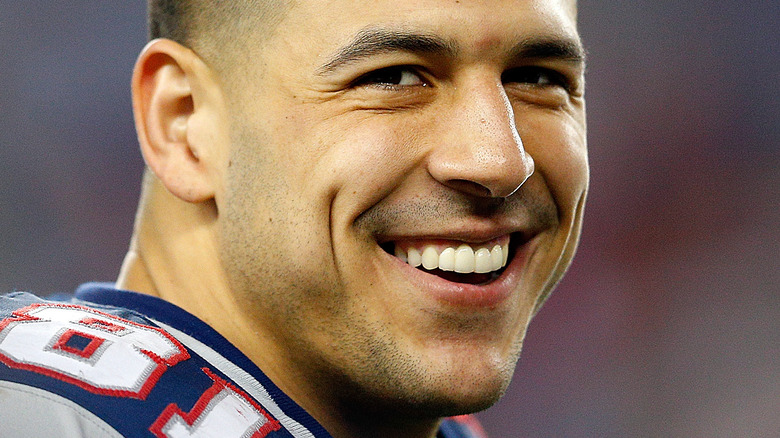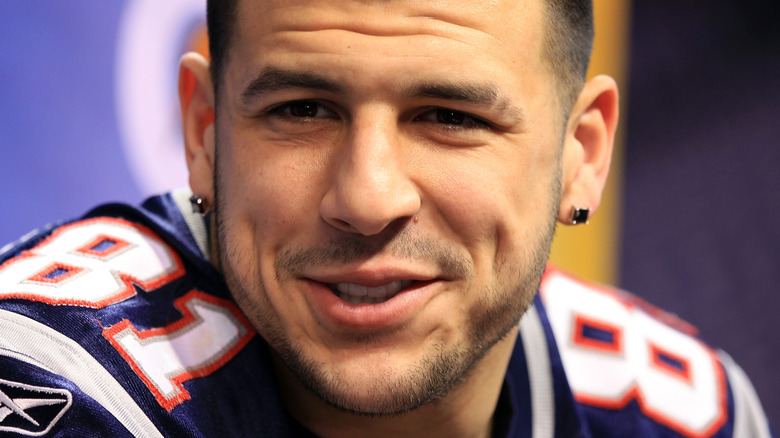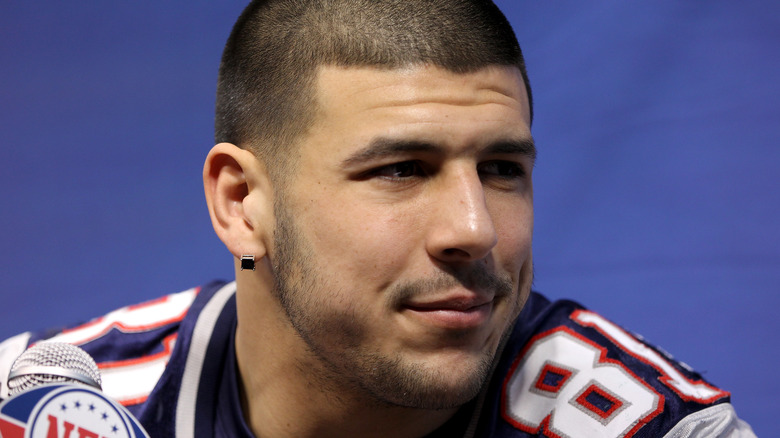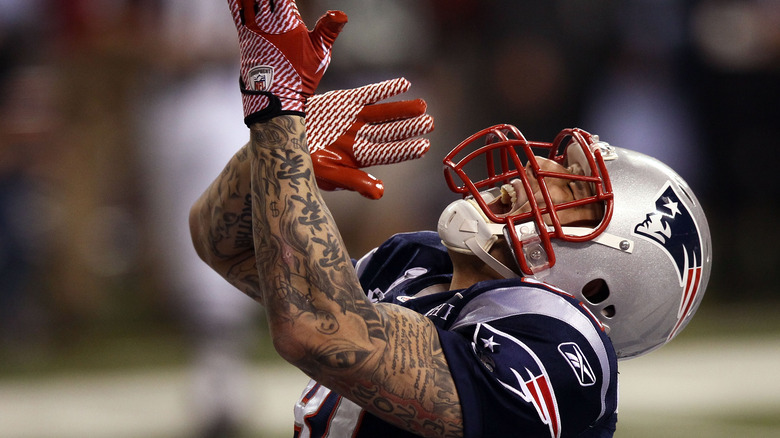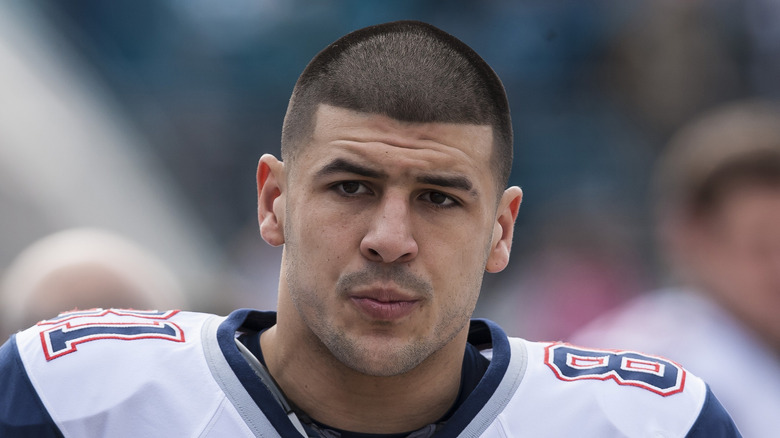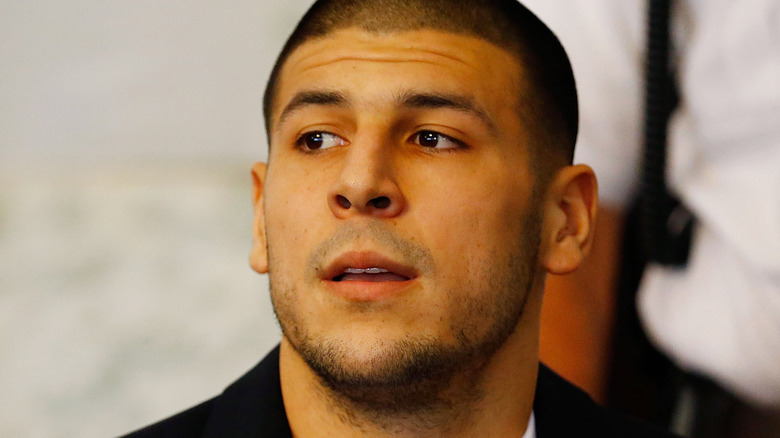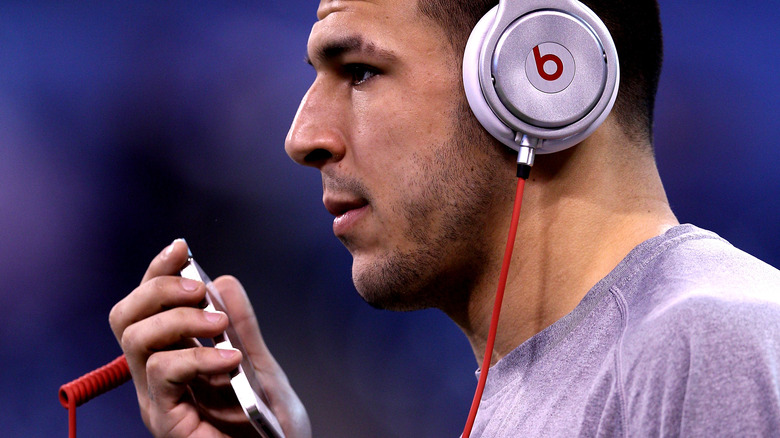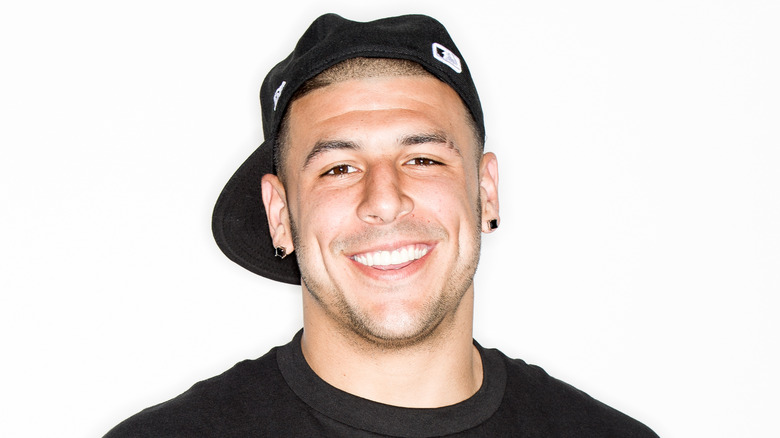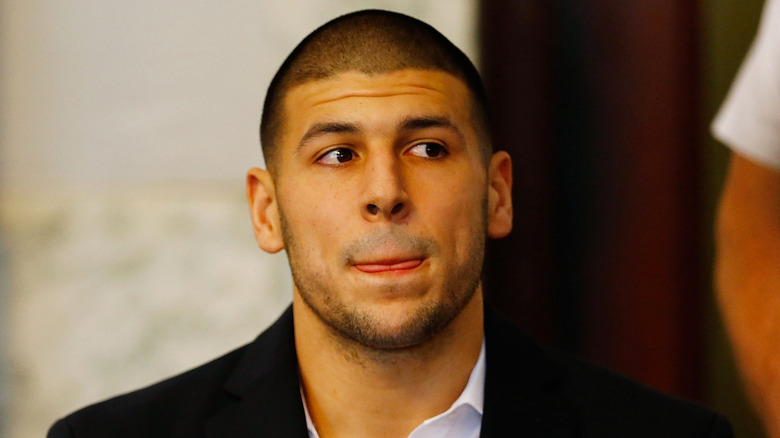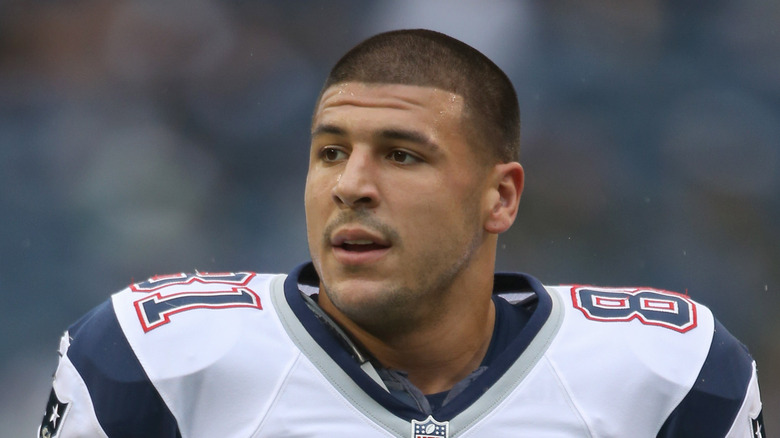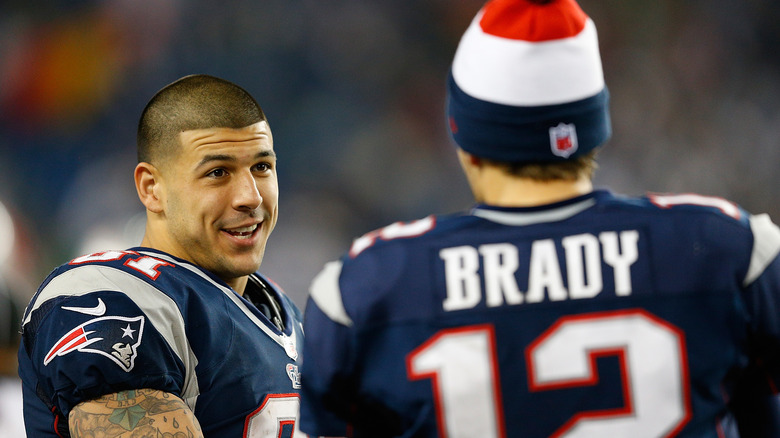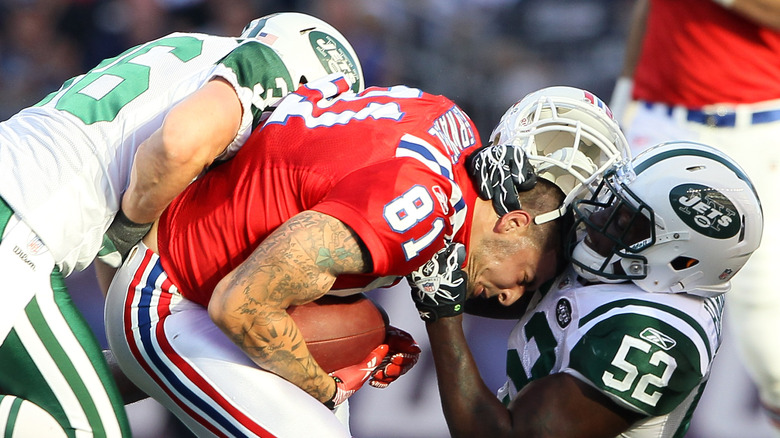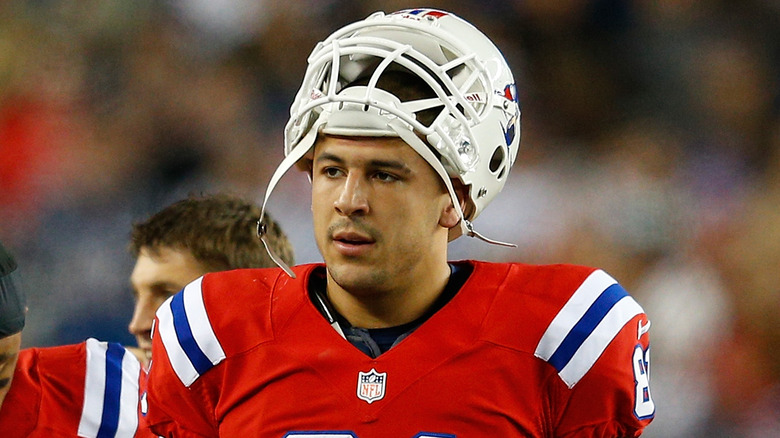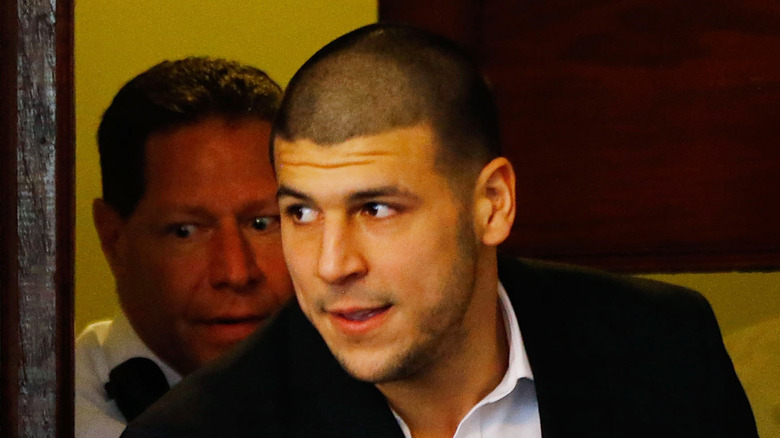The Most Bizarre Things About The Aaron Hernandez Case
It's February 2012. Super Bowl XLVI. Patriots vs Giants. Aaron Hernandez gets the call, set wide right. Tom Brady motions away from his 6'1" 245-pound superstar tight end, feigning interest in his left flank, gives the hard count, snap! Hernandez sneaks over the middle and nabs a 12-yard dime. He lowers his shoulder, blasts a helpless defender into the turf, and bursts into the end-zone. His touchdown dance is pure frenetic mania.
Just over a year later, a 23-year old Hernandez was in cuffs, arrested for the cold-blooded murder of his own friend. There would be more murder charges, revelations of drugs, a hidden sexual identity, and so much more. Football was over. Two murder trials later, so was his life: Hernandez was found dead in his prison cell of an apparent suicide at age 27.
The Boston Globe's investigation into Hernandez's mysterious and shocking double life was later turned into a riveting and aptly titled Wondery podcast called "Gladiator." That's what the man was. Gladiators fought for entertainment, often to the death. They were also born, or sold, into their violent servitude. Aaron Hernandez's young life was full of terrible physical horrors, both on and off the field, and it's not clear if he was ever free either. His spiral from gifted and tenacious NFL player into convicted murderer, is truly among the most bizarre stories in professional sports history.
If you or anyone you know is having suicidal thoughts, please call the National Suicide Prevention Lifeline at 1-800-273-TALK (8255).
Aaron Hernandez's best friend claims they were also lovers in high school
Aaron Hernandez lived a double life beyond comprehension, but if the preternaturally gifted tight end had one secret he wanted to be kept above all others, it was his fluid sexuality. Hernandez's first same-sex partner was also his boyhood best friend and the quarterback of their Bristol Central High in Connecticut football team, Dennis SanSoucie — at least according to SanSoucie.
'We prided ourselves on sports and if anyone knew that we had gay sexual activity together our lives would be ruined, SanSoucie said during an interview for "Aaron Hernandez: An ID Murder Mystery" (via the Daily Mail). "It didn't matter what age we were, we wouldn't even know how to live with ourselves. We had shared some sexual activity together and it continued into high school but we didn't want anyone to know. We were just in complete denial of what was really going on."
SanSoucie first made the revelations in the astounding Netflix documentary "Killer Inside: The Mind of Aaron Hernandez." The former quarterback told filmmakers neither he nor Hernandez really understood what was even happening between them. "We continued because we probably enjoyed it. Yes, we were in a relationship back then," SanSoucie said, via The Washington Post, "but at the time, you don't look at it like that."
Aaron Hernandez's fiance wishes she knew about his alleged gay affairs
No one will ever know how much the stress of Aaron Hernandez's hidden sexual life contributed to the Shakespearean level tragedy that became his life. But his alleged gay affairs were such a closely held secret that even his fiance, Shayanna Jenkins-Hernandez, never knew. The couple was engaged in 2012 and welcomed a daughter, Aviell, that year as well, according to People. Jenkins took Hernandez's name, though the two never wed.
Jenkins-Hernandez told "Good Morning America" in 2020 that no matter what Hernandez had done behind her back — including Hernandez's conviction for murder, and the many stunning revelations in Netflix's riveting documentary — she still believed in his innocence.
Hernandez's multiple alleged gay affairs didn't matter to her either. "You can't describe someone's sexuality without them being here," she told "GMA." Jenkins went on to say she "would not have loved him any differently ... If he did feel that way or if he felt the urge, I wish that I — I was told. And I wish that he would've told me ... I would have understood. It's not shameful and I don't think anybody should be ashamed of who they are inside, regardless of who they love. I think it's a beautiful thing, I just wish I was able to tell him that."
Drug use overshadowed Aaron Hernandez's entire football career
If you ever want an example of how different pro athletes are from us mere pleb mortals, consider Aaron Hernandez wasn't just better at football than literally anyone you've likely ever met, he was better at football ... while allegedly high as a kite.
By high school, Hernandez was reportedly smoking weed before almost every game, according to the Boston Globe's vaunted Spotlight team. He got away with it until he eventually failed a drug test for marijuana while at the University of Florida, according to the Florida Times-Union. At the time, however, the tight end denied reports he had actually flunked multiple tests, saying in 2010 he was, "very surprised and disappointed by the recent inaccurate report of additional violations."
True or not, the scope of Hernandez's drug use went well beyond a little reefer madness. Netflix's "Killer Inside: The Mind of Aaron Hernandez" alleged (via Refinery29) that to deal with the chronic pain from the violent game he loved, the tight end was also hooked on a dangerous anti-inflammatory painkiller called Toradol — a drug commonly used by athletes to mask injuries, which has become a cause for "concern" in pro sports, according to The New York Times. More seriously, a Rolling Stone investigation alleged Hernandez's college coach covered up further drug violations and that near the end of his descent into murderous madness he became a heavy PCP user, so paranoid he "[carried] a gun wherever he went."
If you or anyone you know is struggling with addiction issues, help is available. Visit the Substance Abuse and Mental Health Services Administration website or contact SAMHSA's National Helpline at 1-800-662-HELP (4357).
Horrific abuse marred Aaron Hernandez's childhood
The Boston Globe's description of Aaron Hernandez as a "Gladiator" also refers to a man not born a warrior, exactly, but made one by the cruelty of life.
The Globe team conducted hundreds of interviews and poured over jailhouse phone calls between Hernandez and his inner circle. They found that Hernandez's father, Dennis Hernandez, a local football legend himself, described as a "well-respected anchor of the family," writes Fox61, was anything but a loving patriarch. The elder Hernandez "often severely beat his children." Aaron's brother, Jonathon Hernandez, described one incident tp The Globe: "I picked up the phone once to call, to seek help. And his response was, 'Call them.' And he handed me the phone, and he said, 'I'm going to beat you even harder, you and your brother, and they're going to have to pull me off of you when they knock down the door.'"
Jonathan also revealed Aaron was sexually abused as a child but declined to say by whom. One of Aaron Hernandez's attorneys, George Leontire, confirmed he was told the same thing by Aaron and that Aaron thought the abuse had "made him gay," via CNN. Of the lengthy report by the Globe team, Leontire remarked tellingly, "There was nothing I was surprised about. There was nothing I disagree with."
If you or someone you know may be the victim of child abuse, please contact the Childhelp National Child Abuse Hotline at 1-800-4-A-Child (1-800-422-4453) or contact their live chat services.
Aaron Hernandez lived in constant fear of his abusive father
Aaron Hernandez's father, Dennis Hernandez, was so heralded in Bristol, Connecticut for his own athletic prowess and alpha male persona he was affectionately known by the local community as "the king." But he was more than that in the eyes of Aaron, who worshipped the man who used such harsh discipline to drill athletic aptitude into his kids. He was also perhaps the source of his son's deep anguish over his hidden sexual desires.
Hernandez's high school best friend and lover, Dennis SanSoucie, said in Netflix's "Killer Inside: The Mind of Aaron Hernandez" (via The Washington Post), that Dennis was also a vitriolic homophobe and would've "slapped" his son had he ever discovered their affair. Aaron lived in constant fear his macho father would discover his sexuality.
Aaron's brother, Jonathan Hernandez, went on Dr. Oz in 2020 and told the TV physician that if Aaron had tried to come out to his father, "I don't know if he would've been able to finish his sentence ... My dad would've thought he could beat that out of him." Jonathan went on to say words like "beating" barely describe what they endured at the hands of Dennis.
If you or someone you know may be the victim of child abuse, please contact the Childhelp National Child Abuse Hotline at 1-800-4-A-Child (1-800-422-4453) or contact their live chat services.
Aaron Hernandez seemed to blame his mother for his crimes
The jailhouse phone recordings between Aaron Hernandez and his mother Terri Hernandez paint a picture of a mother-son relationship that would make Oedipus Rex double back on the trail from Thebes and scratch his head.
In long calls excerpted in Netflix's Killer Inside: The Mind of Aaron Hernandez, the football star makes it clear it's his mother, not his allegedly abusive father, he blames for the tragedy that became his life. Hernandez declares in one call (via The Washington Post), "I don't put you down, and you f—-d my whole life up." His mother meekly tries to defend herself, and Aaron softens unconvincingly, "But I forgave you, and it's over with."
Forgiveness, though, is rarely a straight line. Later in that same call, Hernandez says of his father Dennis Hernandez, who died in 2006, "I was the happiest f—–g little kid in the world, and you f—-d me up. And I just lost my father, and I had to go to college. And I had nobody. What the f— did you think I was going to do, become a perfect angel?" He then fantasies about revenge, "Oh my God, if I was with you right now, I would have probably punched the [expletive] out of you. You bring me to this level." On yet another call, Hernandez lays more guilt at his mother's feet, "You're going to die without ever even knowing your son. That's the craziest thing about it."
Did Aaron Hernandez get away with murder?
Aaron Hernandez's first alleged foray into murder came in 2012. The star was at a Boston-area bar with a reputed drug dealer named Alexander Bradley. While playing at the University of Florida, Bradley became Hernandez's marijuana dealer, according to The Washington Post. But Bradley later turned on Hernandez and testified the tight end became irate when a man named Daniel de Abreu bumped into him and caused him to spill his drink. "I knew something was brewing. It was real quick," Bradley told a jury in Hernandez's eventual double murder trial. "Maybe a minute, the whole thing."
Bradley claims when Hernandez saw de Abreu leaving they followed and pulled alongside Abreu's car which had another man inside, named Safiro Furtado. Hernandez fired five shots, killing both men, according to Bradley. Hernandez later got an ominous tattoo with five spent bullet casings, the prosecution argued in commemoration of the kill. "I got one in the head, one in the chest," Hernandez allegedly bragged as the two sped away from the scene. "I remember him saying, 'Don't tell anybody,'" Bradley testified. "He just said, 'Don't say nothing.'"
However, in 2017, Hernandez was acquitted according to the AP. The physical evidence wasn't there and Bradley's unsavory reputation didn't help. District Attorney Daniel Conley said the de Abreu and Furtado families were devastated. "These were two hardworking, humble, Cape Verdean immigrants. It was unnecessary, and it was wrong, and it shouldn't have been done."
Aaron Hernandez killed a friend who may have known his secrets
Aaron Hernandez was acquitted of double murder in 2012, but he didn't fare so well in court after being charged in the mysterious shooting of his friend, Odin Lloyd, just one year later. And the strangest part of the case is: there is no clear motive.
On the evening of June 16, 2013, Hernandez began exchanging texts with Lloyd and eventually picked him up at his home in Boston at 2:33 AM, according to USA Today. Loyd cryptically texted his sister to let her know who he was with, calling Hernandez "Nfl" and adding ominously, as if he knew what he was walking into, "just so you know." Lloyd was shot dead about an hour later less than a mile from Hernandez's home.
Hernandez was found guilty of the murder in 2015, but a judge threw out the conviction after Hernandez's death in prison. An arcane Massachusetts law voided the conviction of a dead person, according to the AP. However, in 2019 the state's supreme court called the law "outdated" and reinstated the jury's verdict. It's not known why Hernandez killed his friend in cold blood, but according to Newsweek's Michele McPhee, "interviews with multiple law enforcement officials directly involved in the case say Lloyd — a semipro football player who was dating Hernandez's fiance's sister at the time — had information the football star did not want out: that he was bisexual."
Aaron Hernandez allegedly shot another friend in the face
Aaron Hernandez's alleged accomplice on his first murder charge in 2012, Alexander Bradley, says the trigger happy tight end tried to kill him, too. During his 2017 testimony, the drug dealer and prosecution star witness told the jury in 2013 that he "woke up with Mr. Hernandez pointing a gun at my face ... right between my eyebrows," according to The Washington Post.
Bradley claims Hernandez fired the gun, nearly killing him, and causing him to lose one of his eyes from the point-blank blast. Hernandez and Brady had continued their deviant friendship following the 2012 alleged double murder until a trip to Florida in 2013 where they allegedly fought over a bill and whether or not they'd go back to a nightclub to retrieve Bradley's cell phone.
Bradley later fell asleep in a car with two other men. He awoke to the gun in his face. Once shot he was pulled from the car and left to die and "plot his revenge," as The Washington Post puts it. When Bradley phoned Hernandez after the shooting, very much alive, Hernandez was stunned, and Bradley attempted to extort his NFL frenemy but failed. In 2014, in a not-so-shocking twist, Bradley was involved in an exchange of gunfire outside a Connecticut nightclub. He was hit multiple times, according to the AP, but once again survived. He was sentenced to five years in prison, according to the Hartford Courant.
Getting drafted to the Patriots may have doomed Aaron Hernandez
Wherever you go, there you are. But in reality, sports save lots of athletes from bad situations by physically moving them into better situations. So ironically, the Aaron Hernandez story might've turned out differently if he wasn't drafted by the most successful and disciplined franchise in football of his era, The New England Patriots, circa 2010. The team plays less than a two-hour drive from Bristol, Connecticut, where Hernandez hails.
Two months after the double murder for which Hernandez was implicated, he requested a trade from the Patriots. By this point, Hernandez had also allegedly shot his best friend in the face. The tight end told the team he feared for his families' safety, but coach Bill Belichick, known for taking gambles on guys with off-the-field issues, wasn't about to let a generational talent walk out the door.
Instead, the Patriots organization made a fateful move. They found Hernandez a hideout — a semi-secret apartment and hired additional security. But as revealed in Netflix's "Killer Inside: The Mind of Aaron Hernandez," the second home became a party spot for Hernandez's and his hometown crew. "Now the guy's got a house; why does he need another apartment?" Tim SanSoucie, the father of Hernandez's high school best friend, told Netflix (via The Washington Post), adding, "And why are you helping him get it? Did you think he was going to be painting Bob Ross pictures over there?"
Aaron Hernandez had unprecedented brain damage
Drug use, a toxic peer group, an abusive childhood — all could have played a factor in what Aaron Hernandez became. But the hard-hitting big-man was also suffering from "the most severe case of chronic traumatic encephalopathy ever discovered in a person his age, damage that would have significantly affected his decision-making, judgment, and cognition," Boston University medical researchers told The Washington Post at a press conference in 2017.
Hernandez's supporters were not unaware something was off with his mind, and after his death in 2017, his family left his brain to science, according to the Daily Mail. It was a unique opportunity for researchers to see the ravages of repeated head trauma on a specimen so young. The head of BU's CTE Center, Ann McKee, called the football star's concussion-ravaged 27-year old brain, "one of the most significant contributions to our work."
More is being understood about this degenerative brain condition thought to be caused by repeated head traumas. It's somewhat analogous to the physical deterioration of brain tissue caused by diseases of old age like Alzheimer's, and the NFL has instituted safety policies to try to deal with the issue. Hernandez had stage 3 CTE, which researchers had never seen in anyone below the age of 46. "Whether or not that's because they're playing more aggressively or if they're starting at younger ages, we don't know," McKee said.
What happened to Aaron Hernandez's money?
Aaron Hernandez's career was cut short, and so was the football fortune that could've gone to his family. In 2012, the star signed a monster, five-year $40 million contract, but was only able to keep some $2 million and change after his "legal troubles" started in 2013, according to NFL.com. The Patriots filed a grievance against Hernandez that year, and despite the player's association's stern objections, the team won back some of the salary cap cash they were set to owe, according to ESPN and Fox Business.
Hernandez's big contract also had $16 million in "guaranteed money" — but those guarantees didn't actually extend to murder. In the course of one year, Hernandez chose to throw away generational wealth to live the dangerous and much less lucrative life of a low-level street criminal. At the time of his death in 2013, Hernandez had an estate with "no monies available and no identifiable personal assets," according to the Boston Herald. Hernandez's fiance was therefore granted the right to sell Hernandez's home, worth $1.3 million, according to Bleacher Report.
Aaron Hernandez's alleged prison lover spoke out
A man claiming to be Aaron Hernandez's jailhouse lover, named Kyle Kennedy, allegedly received a $47,000 custom watch from Hernandez, according to the Daily Mail. Kennedy describes himself as a "regular kid that grew up and I got sidetracked by drugs and gangs," according to the 2020 Reelz special "Aaron Hernandez: Jailhouse Lover Tells All" (via People). Kennedy calls his supposed prison beau, "the most loyal person I've ever met" and claimed that while inside, "we used to do everything together." This allegedly included continuing Hernandez's criminal entrepreneurship. "We sold drugs every day, we did drugs every day, Kennedy recalls fondly."
If Hernandez was, indeed, bisexual, it doesn't seem that unusual for him to develop a relationship with another main in jail. What is odd, however is that prior to Kennedy's Reelz special, he got into something of a battle of words in the press with Hernandez's fiancee, Shayanna Jenkins-Hernandez, who refuted Kennedy's of closeness with Hernandez as "a crock of bull" to Dr. Phil in 2017.

